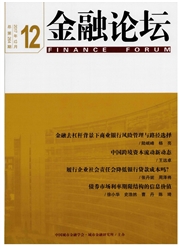

 中文摘要:
中文摘要:
在解决因信息不对称而引发的代理冲突方面,金融系统有比较优势和规模优势,因此也具备监督经理和提高投资效率的功能。但在金融抑制政策体系中,行政力量对金融中介的替代使这一功能基本消失。抑制政策在长期内降低投资效率,不利于经济发展。相应地,金融市场化改革能提高宏观投资效率。以银行部门为主,中国自20世纪90年代逐渐推行金融市场化改革。以1992-2006年为样本区间,就银行业市场化改革对宏观投资效率的影响问题,本文提供了实证分析。研究发现,银行业市场化显著提高了宏观投资效率。
 英文摘要:
英文摘要:
The financial system has the comparative and scale advantage when dealing with the agency problem resulting from the information asymmetry. Therefore, the financial system has the function of supervising managers and improving the investment efficiency. However, this function has been undermined because of the substitution of administrative power for financial intermediaries in a system of finance restrain. The restrain policy decreases the investment efficiency in a long run,which is unfavorable to economic development. Therefore, the financial liberalization reform can advance the macro-efficiency of investment. Focusing on the banking, Chinese government began to carry out the financial liberalization reform since 1990s. With the data from 1992 to 2006, the paper makes an empirical analysis on the influence of the liberalization reform of the banking on the macro-efficiency of investment. The result reveals that the liberalization of the banking remarkably improves the macro investment efficiency.
 同期刊论文项目
同期刊论文项目
 同项目期刊论文
同项目期刊论文
 期刊信息
期刊信息
